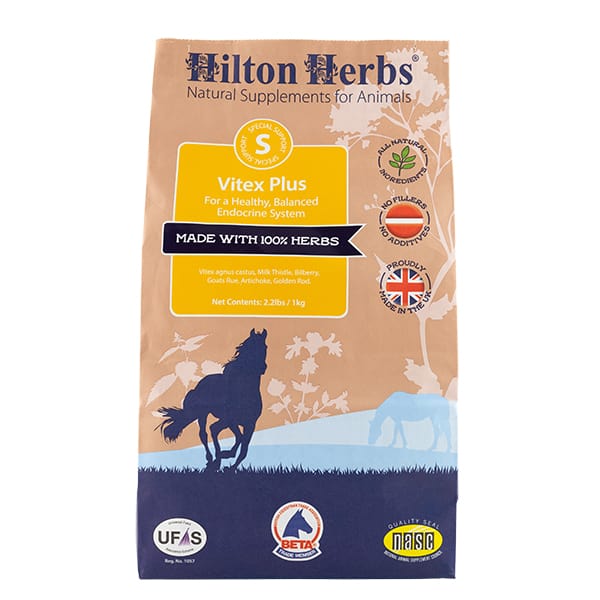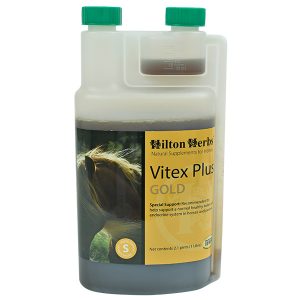Important Information for Owners of Horses with Cushing’s Syndrome
|
What Is Horse Cushing’s Syndrome? A small benign tumor in the pituitary gland causes equine Cushing’s syndrome. Since the pituitary governs the entire endocrine system, a number of conditions are associated with the disease. Cushing’s disease is also referred to as hyperadrenocorticism. A horse with Cushing’s usually develops the condition in the mid to late years of life (average age, 20 years), although it is sometimes diagnosed in horses as young as seven. The Healing Barn DOES NOT recommend the use of Peroglide in any treatment of horses.
Hilary Self, Author and Co-Owner of Hilton Herbs, is a medical herbalist and the one responsible for the companies formulations.. Her clinical research into the use of herbs for animals has lead to the success of Hilton Herbs.
Hilary’s herbal formulation of Vitex Plus for Horses with Cushings is a fantastic product that we here at The Healing Barn believe in 100%. We have seen absolutely fabulous results using Vitex Plus on Cushing’s Horses both here at our rehab facility and also all across the United States. The Healing Barn sells to retail customers and supply North American dealers with Hilton Herbs. We have unmatched access to results obtained by different therapies.
When owners try Vitex Plus they save themselves a lot of money and more importantly save their horses from what is sometimes years of trial and error testing. You may find other products that have only Vitex Agnus Castus Seed, but it’s Hilary’s mixture that includes several other herbs that treat everything that’s going on within your horse that always seems to have the best results. Blondie is one of our rescues that was going to be put down because of her uncontrolled Cushing. When Blondie was dropped off at The Healing Barn she was foundered and could hardly stand. She had puss coming out of both of her front cornnet bands. Her owner said she couldn’t afford to treat her. The owner only considered three choices: give her back to the previous abusive owner that she had originally rescued Blondie from OR have her put down. Fortunately, there was a third choice, The Healing Barn was willing to accept Blondie. Blondie has now been healthy and happy for about 8 years thanks to Hilton Herbs Vitex Plus. She is presently owned and thoroughly enjoyed by a grandmother and her grand-kids. All thanks to Vitex Plus and Nancy Swigart’s perseverance through the use of Natural Alternatives. Health Management for a Horse with Cushings – Avoiding stressing the horse. The hormonal profile of many horses with Cushing’s already indicates high stress levels, so reducing stress is critical. – Providing a safe, comfortable “sanctuary” for the horse. – Sticking to a strict routine, which will help minimize stress. – Keeping water and feed conveniently located and in the same place. – Clipping the horse in warm weather; using blankets when it is cold. – Keeping up grooming to minimize skin diseases. – Keeping hooves in good shape. – Checking teeth regularly and having them checked by a professional twice a year. – Avoiding turning the horse out with aggressive horses. – Avoiding contact with horses from a new location. – Keeping immunizations to a minimum/ making sure all necessary shots are given. – Deworming regularly (usually every 30 – 45 days). – Providing an appropriate diet for the horse. This will usually involve elimination of simple carbohydrates. If you have a horse with Cushings please listen to the above – must hear interview. You are guaranteed to come away with a new understanding of Cushings and what to be aware of to better maintain your Cushings horse. FDA’s Market Withdrawl Of Peroglide (marketed as Permax) On March 29, 2007, the Food and Drug Administration issued a Public Health Advisory titled: Voluntary Market Withdrawal of Permax. The drug is also known and marketed by its generic name pergolide [per-go-lide]. The FDA (read the entire FDA Press Release Here) announced that the companies that manufacture and distribute pergolide have agreed to withdraw this drug from the market due to the potential for heart valve damage. Two new studies showed that patients who were treated with pergolide had an increased chance of serious damage to their heart valves when compared to patients who did not receive the drug. “Based on important new drug safety information, FDA has been working with the manufacturers of pergolide products to voluntarily remove these drugs from the market,” said Douglas Throckmorton, M.D., deputy director of FDA’s Center for Drug Evaluation and Research. “The FDA’s increased evaluation of post-market safety is benefiting the public because, in this case, as new data about the product became available, we were able to remove a less safe drug from the market.” Two recent New England Journal of Medicine studies confirm previous findings associating pergolide with increased chance of regurgitation (backflow of blood) of the mitral, tricuspid, and aortic valves of the heart. Valve regurgitation is a condition in which valves don’t close tightly, allowing blood to flow backward across the valve. Symptoms include shortness of breath, fatigue and heart palpitations. In light of this additional post-market safety information, the companies that manufacture and sell pergolide will stop shipping pergolide for distribution and, in cooperation with FDA, will withdraw the products from the market. Why would you put your horse’s health at risk? We are not aware of any studies regarding the damage to horses hearts because of Pergolide. – Why risk your horses heart? The Healing Barn does not accept the choice of Pergolide as a viable option when there are unknown effects that may be worse than the Cushing’s itself. Horses build up a resistance to Pergolide – dosing has to be continually increased. – What are you going to do when your horse reaches the maximum allowable dose? – Will your horses life be shortened because of the potential damage from Pergolide? – What happens when max dose is reached? – Why risk overdosing your horse with a dangerous chemical? – Why take a chance of creating heart problems in your horses? – Why take a chance of getting a potentially dangerous drug on yourself or your family? The Healing Barn is dedicated to the safety and health of your horses. The Healing Barn DOES NOT recommend the use of Peroglide in any treatment of horses. |




